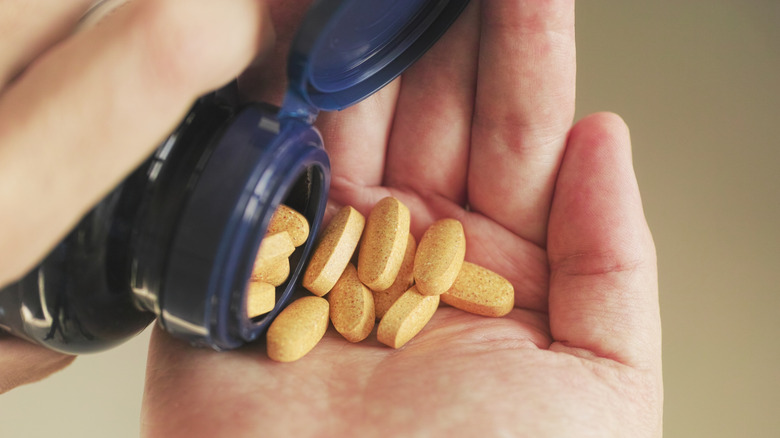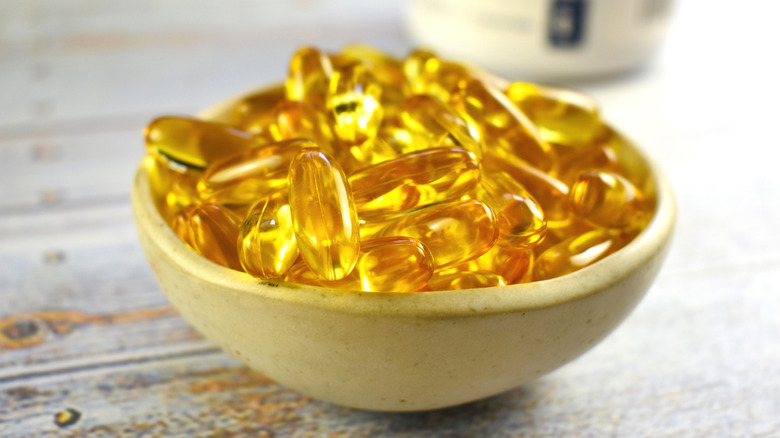
Maskot/Getty Images
As unpleasant as it may be to consider, by the time most men reach the age of 60, they will have developed an enlarged prostate. By the time men reach their 80s, that number can jump all the way up to 90%. This condition, known as benign prostatic hyperplasia (BPH), can lead to a number of difficult issues, including sexual issues and problems with urination.
Men who have an enlarged prostate may notice some symptoms. These include urinary problems, such as a weak stream, stopping and starting urination, or dribbling when urination winds down. There could also be pain during urination or ejaculation or an odd color or smell to your urine. However, there are a number of things that one can do to help mitigate or positively affect BPH. Making lifestyle changes and even managing the way you urinate can go a long way to making BPH easier to live with.
Eat a prostate-friendly diet

Catherine Falls Commercial/Getty Images
What you eat can have a strong effect on your prostate health. While a diet that is high in red meats, processed meats, and dairy products can contribute to your risk of an enlarged prostate, a diet rich in fruits, vegetables, and fish can keep your prostate healthy. Cruciferous vegetables, such as broccoli and cauliflower, antioxidant-rich berries, and fatty fish like salmon and sardines, can keep your prostate from growing and also may ward off cancer.
Excessive sugar consumption is also a no-no for prostate health. Cancer growth is often spurred on by glucose, which makes sugar a dangerous element to add into the mix. In many cases of prostate cancer, a gene called PTEN stops working. This gene regulates cell growth, and when it’s inactive, tumors can form and spread. This can be exacerbated by high insulin levels, so keeping them under control by taking sugar out of the equation is a good thing.
Prioritize fiber

Sultan Amir/Shutterstock
A high-fiber diet offers numerous health benefits, many of which are particularly related to prostate health, per research.
In addition to eating fruits and vegetables, having a diet that’s high in fiber can keep your prostate cancer risk down and also reduce the risk of progression of cancer. According to a 2013 study conducted on mice and published in Cancer Prevention Research, a high-fiber diet prevented tumors in the prostate from forming new blood vessels needed to keep the tumors viable. As a result, the progression of the tumors was slowed significantly.
Meanwhile, a 2025 review published in Food & Nutrition showed that high fiber intake played a significant role in lowering the risk of developing cancers of the digestive, reproductive, and urinary systems. Additionally, constipation can worsen the symptoms of BPH, causing undue pressure on the bladder. Keeping the digestive system in motion can be a good thing for prostate health.
Maintain a healthy weight

voronaman/Shutterstock
Overweight men can find themselves suffering from BPH as a result of a number of factors, as evidenced by a 2013 study published in European Urology. According to the study, obesity can actually turn testosterone into estrogen, which can make the prostate grow larger. It is also responsible for low-grade inflammation due to raised cortisol levels, which can negatively impact the prostate and cause enlargement. Regular exercise can not only help shed excess weight, but it can also improve circulation and reduce inflammation, both of which can be beneficial for an enlarged prostate.
According to a 2022 study published in the Journal of Translational Medicine, men who had larger waistlines compared to an average person saw their risk of developing BPH go up by 24%. Additionally, men who had more sedentary lifestyles had a 31% higher risk of developing BPH than men who were more active.
Limit your caffeine intake

Stefania Pelfini, La Waziya Photography/Getty Images
Caffeine is most definitely a source of trouble for people suffering from BPH. Because it is a diuretic, caffeine can spur on your urge to urinate and make you have to urinate more frequently. It can also cause the bladder to contract. Avoiding caffeine and alcohol, especially at night, is a good way to help keep your prostate from becoming enlarged or getting larger.
On the other side of the coin, a 2011 study published in the Journal of the National Cancer Institute showed that men who consumed six or more cups of coffee a day had a nearly 20% lower risk of developing prostate cancer. For more aggressive forms of prostate cancer, the risk was as low as 60%. However, the caffeine in coffee did not seem to be a factor, as the study showed that drinking decaffeinated coffee produced the same results.
Manage stress

TetianaKtv/Shutterstock
While stress can’t cause BPH, it has the potential to make it worse. Stress can release cortisol, which then can suppress the production of testosterone. It can also cause the conversion of testosterone to dihydrotestosterone (DHT). Too much DHT in the prostate can lead to cell growth and eventual enlargement. According to a 2016 study published in the Asian Pacific Journal of Cancer Prevention, chronic stress may also contribute to prostate cancer. The increase of cortisol levels also raises estrogen and leptin, two hormones that are linked to prostate growth and inflammation.
A 2007 study published in Urology had 83 men who had BPH undergo a stress test as their blood pressure, testosterone, and cortisol levels were monitored. The study found that higher blood pressure reactions to stress were linked to increased prostate size, poorer emptying of the bladder, and an overall impact on quality of life. In addition, higher cortisol levels increased feelings of discomfort and disruption due to BPH symptoms.
Improve your sleep quality

Just dance/Shutterstock
Sleep deprivation can actually cause inflammation in the body, according to Harvard Health. Not getting enough sleep has been shown to raise inflammatory molecules in the body, such as cytokines, interleukin-6, and C-reactive protein. This last protein in particular is seen in people who are at risk for cardiovascular issues and diabetes. According to a 2011 study published in Reviews in Urology, having elevated cytokines has been linked to the development of BPH. Along with other inflammatory markers, cytokines could play a role in prostate growth by triggering an immune response that leads to tissue enlargement. As such, poor sleep could be a risk factor for an enlarged prostate.
Additionally, a 2023 study published in BMC Public Health showed that men who suffered from BPH reported having much worse sleep quality than men who did not. On top of that, the worse their sleep was, the higher the risk of developing BPH was as well. Even when other factors were considered, such as health conditions and lifestyle, poor sleep quality was significantly linked to a higher risk of developing an enlarged prostate.
Take prostate-supporting supplements

StepanPopov/Shutterstock
Saw palmetto is often looked at as being potentially beneficial for men with urinary tract issues that can stem from an enlarged prostate. It’s not yet entirely clear how this extract, which is taken from a palm plant indigenous to the southeastern United States, can help with prostate issues. However, it seems that the fatty acids produced by saw palmetto may keep testosterone from being converted to dihydrotestosterone, or DHT, which can contribute to prostate growth.
According to a 2023 study published in BMC Urology, men who took saw palmetto that had been enriched with the plant compound beta-sitosterol saw significant improvements in their prostate symptoms and urine flow. Their BPH symptoms decreased, their levels of prostate-specific antigen (PSA) went down, they had less urine left over after peeing, and their testosterone levels increased. As such, the study posits that saw palmetto enhanced with beta-sitosterol may be even more effective than just saw palmetto alone for treating an enlarged prostate.
Get regular checkups

Tualek Photography/Shutterstock
Prostate exams, while not overly pleasant, are something that every man over the age of 50 should be having annually. For people who have had a history of prostate cancer in the family, prostate exams should begin by age 45. Part of the exam involves your doctor inserting a finger in the rectum to feel the prostate and detect any abnormalities. In addition, you may have a blood test done to determine the levels of PSA in your blood. The higher your PSA levels, the more testing you may need to determine if everything is running smoothly with your prostate.
An enlarged prostate is something that can raise your PSA levels. Higher PSA levels could also be caused by an inflamed prostate or an infection in the area. Should your PSA levels be higher, your doctor may want to order further testing to determine the cause. He or she may also want to consider medication to treat an enlarged prostate or other urinary conditions to try and bring the numbers down. Regular checkups can ensure that your prostate is functioning optimally and manage any enlargement effectively.
Monitor your vitamin E intake

Blanchi Costela/Getty Images
Vitamin E supplements can have a number of positive effects on the body. It can be helpful for reducing oxidative damage and keeping free radicals at bay, can help reduce the risk of heart disease, and may improve the health of people who suffer from nonalcoholic fatty liver disease. It also may have cognitive benefits and improve lung function, particularly in older adults.
However, according to a 2011 study published in the Journal of the American Medical Association, there may be a troubling connection between vitamin E and prostate cancer. The study showed that men who took 400 international units (IU) of vitamin E daily had more incidents of prostate cancer than men who took a placebo. Over a seven-year period, there were 76 cases of prostate cancer among those who took vitamin E versus 65 in the placebo group, representing a 17% increase.
Credit: healthdigest.com






